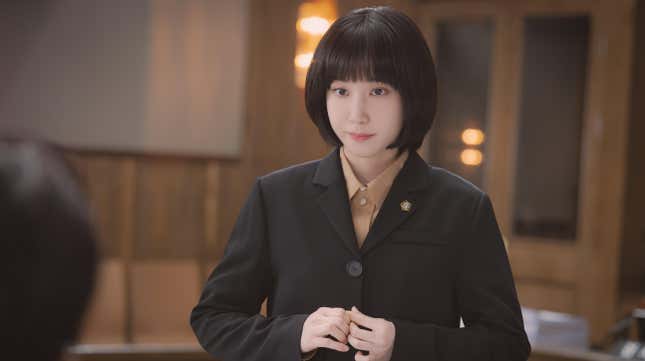
The significance of South Korea’s endearing new drama Extraordinary Attorney Woo is neatly encapsulated in the third episode, titled “This Is Pengsoo.” Autistic rookie lawyer Woo Young-woo (Park Eun-bin) is assigned to defend an autistic client accused of killing his older brother. Over the next hour, the show humanely portrays the range of those on the autism spectrum and challenges the subtle ways of discrimination against them. The case has a momentous impact on an efficient Young-woo, who briefly quits her prestigious law firm, fearing she’s the “weakest link” of the team. And Extraordinary Attorney Woo essentially becomes a nuanced and wholesome attempt to disprove this fear.
The show, which aired on South Korea’s ENA channel and streams on Netflix globally, is an instant charmer. Anchored by Eun-bin’s superlative lead performance, it sheds a light on Young-woo’s reality without turning her into a quirky caricature, following her as she joins one of the country’s top law firms and finds a lovely unexpected mentor, an ally, a nemesis, hidden family secrets, and obviously an enchanting love interest. Extraordinary Attorney Woo deftly straddles being genuinely heartfelt and funny, and it balances genres (from legal to romance to workplace) without going over the top. The 16-episode first season, wrapped on August 19, is an ideal watch. And its streaming numbers seem to agree.
About those numbers: Since its debut in late June, the show has mostly retained the number one spot for Netflix’s non-English programming, with its viewership growing steadily as new episodes dropped weekly. According to Netflix, the number of hours viewed more than tripled from 23,950,000 for the week of July 4 to 77,430,000 for the finale during the week of August 15. That’s right: Better Call Saul and She-Hulk: Attorney At Law aren’t the only legal dramas to occupy prime pop-culture real estate recently.
Extraordinary Attorney Woo finds success due to its moving, fully formed scripts and interesting legal cases, which involve everything from helping a North Korean defector to solving marriage disputes to battling a rival law firm. Writer Moon Ji-won goes all-in as Young-woo’s personality begins to thrive while learning from various new social situations, whether it’s fighting in court, wooing a crush, or mingling with children. Each event also deepens her colleagues’ (and the audience’s) understanding of how her mind and eidetic memory function.
Eun-bin’s grounded approach to playing Young-woo elevates the show further. She’s a magnetic force onscreen. In an interview with TV Guide, the actor revealed she took almost a year to accept and prepare for the role, carefully deciding not to simply mimic anyone with an autism spectrum disorder to avoid prejudices and stereotypes. The choice pays off because both the show and its star’s choices feel authentic.
Like many K-dramas (Netflix has several at your disposal), EAW also spends time developing all the supporting characters and their dynamics, making it a strong ensemble outing. You might come for Young-woo’s swoon-worthy love story with earnest Hanbada litigator Lee Jun-ho (Kang Tae-oh). (Never has a revolving door held such romantic value.) But you’ll stay for her supportive friendships with BFF Dong Geu-ra-mi (Joo Hyun-young), whose swaggy greeting quickly became a viral TikTok trend, and with a co-worker, Choi Su-yeon (Ha Yoon-kyung). Extraordinary Attorney Woo smartly evades turning the two women into snide competitors at work, organically evolving their bond as Su-yeon stands up for Young-woo against office bullies.

The show deals with serious themes and issues, but don’t worry, it doesn’t hesitate to churn out the jokes. In fact, it sneaks in plenty of humor to counter the heaviness of its more somber storylines. It’s realistic with a dose of surrealism, mostly evident when Young-woo gets crucial insights about any cases in the form of whales happily gallivanting in the ocean. (She’s passionate about the majestic sea creatures.) It sounds random, but it’s really just a metaphor because she views their freedom and independence as her own peak goal. And the delightful season one finale delivers exactly that.
Extraordinary Attorney Woo certainly falls victim to cheesy K-drama clichés along the way (a surprise disease diagnosis! an unnecessary breakup! a sudden enemies-to-lovers switch!), but it’s an excellent effort at pulling back the curtain on a neurological disability without falling into ableist tropes. It’s a refreshing addition to the shows that have explored the subject matter over the last few years, including Netflix’s Atypical, Prime Video’s As We See It, ABC’s The Good Doctor, Freeform’s Everything’s Gonna Be Okay, and another K-drama, It’s Okay To Not Be Okay.
The show is a delightful balm the world needs in the face of everything going on. It’s no wonder it has racked up over 69 million viewing hours over a span of a few weeks. Extraordinary Attorney Woo is easily the international show of the summer, proving K-dramas’ resonance and wide reach and reinforcing the power of potent storytelling, regardless of language or country of origin.